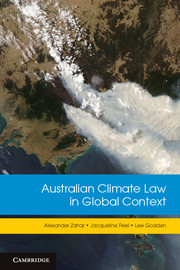Book contents
- Frontmatter
- Contents
- Acknowledgments
- Abbreviations and definitions
- Figures, tables and boxes
- Table of cases
- Table of statutes
- Table of treaties and other international instruments
- Introduction
- 1 Climate law
- 2 Legal elements and ongoing development of the international climate change regime
- 3 Measurement and verification of state emissions and legacy of the Kyoto Protocol’s compliance system
- 4 Development of climate law in Australia
- 5 Putting a price on carbon
- 6 The regulatory network of the Clean Development Mechanism
- 7 The emerging scheme for the protection of forests in developing countries (REDD)
- 8 Climate finance, technology transfer and capacity-building for sustainable development
- 9 Legal and regulatory frameworks for transition to a low-carbon economy
- 10 Biosequestration and emission reduction regulation in the Australian land sector
- 11 Adaptation to climate change through legal frameworks
- Postscript
- Bibliography
- Index
- References
Postscript
Published online by Cambridge University Press: 05 December 2012
- Frontmatter
- Contents
- Acknowledgments
- Abbreviations and definitions
- Figures, tables and boxes
- Table of cases
- Table of statutes
- Table of treaties and other international instruments
- Introduction
- 1 Climate law
- 2 Legal elements and ongoing development of the international climate change regime
- 3 Measurement and verification of state emissions and legacy of the Kyoto Protocol’s compliance system
- 4 Development of climate law in Australia
- 5 Putting a price on carbon
- 6 The regulatory network of the Clean Development Mechanism
- 7 The emerging scheme for the protection of forests in developing countries (REDD)
- 8 Climate finance, technology transfer and capacity-building for sustainable development
- 9 Legal and regulatory frameworks for transition to a low-carbon economy
- 10 Biosequestration and emission reduction regulation in the Australian land sector
- 11 Adaptation to climate change through legal frameworks
- Postscript
- Bibliography
- Index
- References
Summary
The Copenhagen Accord calls for coordinated state action ‘to hold the increase in global temperature below 2 degrees Celsius’. In fact, the current emission reduction pledges of the Accord’s signatories imply a temperature increase of between 2.5 and 5°C by 2100. Experts estimate the gap between a bearable but still risky 2°C future and the dangerous future that awaits us under the current pledges to be 6–11 Gt of CO2 eq. emissions per year by 2020 – depending on whether the pledges are followed through in their strong or weak form. To bridge the gap, countries must, starting now, implement increasingly stringent mitigation measures over the next few years, so that by 2020 global emissions are reduced by a further 6–11 Gt CO2 eq. to around 44 Gt CO2 eq. for that year.
In its 2011 Bridging the Emissions Gap report, UNEP argues that policy-makers have many options for narrowing or closing the emissions gap by 2020. Countries could make their energy systems more efficient than under business-as-usual conditions; they could produce a larger share of their primary energy from renewable energy sources in some combination; they could reduce emissions from the forestry, agriculture and waste sectors through better management strategies and innovative measures such as credit schemes; and they could achieve all of this, and more, with the technologies at hand and at a cost that is not prohibitive. This is not to say that any of these outcomes is inevitable. How quickly renewable energy production grows to meet the world’s energy needs, for example, depends heavily on government action to reduce the relative cost of renewable technologies. Change ‘will require continued efforts, both “top-down”, through international diplomacy, and “bottom-up”, through national policy’.
- Type
- Chapter
- Information
- Australian Climate Law in Global Context , pp. 410 - 412Publisher: Cambridge University PressPrint publication year: 2012



